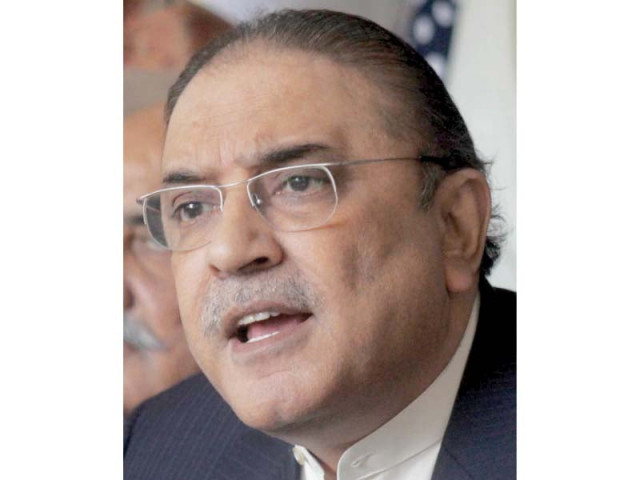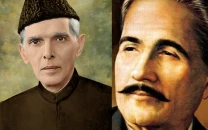PPP seeks civilian judges, shorter military court tenure
Unveiling nine points, Zardari proposes one-year term for the courts

Asif Ali Zardari. PHOTO: ONLINE
The military courts were set up after the December 2014 deadly rampage at the Army Public School in Peshawar for speedy trial of detained terrorists. The courts, however, ceased to function on January 7 according to a sunset clause under which they were set up expired. No consensus was reached between the government and the opposition on their revival despite frequent meetings on the issue.
On February 28, political parties in parliament consented to the re-establishment of military courts for another two years. The meeting was not attended by leaders of the PPP, who had earlier called a multi-party conference on March 4 to discuss the matter with other politicians.
Addressing a press conference in the federal capital, Zardari said that now the ball was in the government’s court.
“We will take the matter to parliament. If our proposals are not accepted, it will be difficult for us to support [the revival of] military courts,” he said but hastened to add that he was not against military courts.
The PPP says (a) military courts should be presided over by one sessions judge or additional sessions judge along with a military officer; (b) the sessions/additional sessions judge will be nominated by the chief justice concerned of the relevant high court; (c) military courts should be extended for a period of one year starting from the date of approval of the new constitutional amendment; (d) cases will be subject to judicial review under Article 199 of the Constitution; (e) once a review is filed the high court concerned must decide the case within 60 days; (f) an accused to be produced within 24 hours before the court concerned where the prosecution should provide grounds of arrest to seek his/her remand; (g) the accused shall have the right to engage counsel of their choice and the provisions of Qanoon-e-Shahadat 1984 should also apply in all such cases.
Zardari said the PPP had always stood by the armed forces in the war against terrorism. In the same breath, Zardari also criticised the government for its failure to strengthen the civil judicial system to try terrorists as promised at the time of adopting the 21st constitutional amendment.
The PPP co-chairman also criticised the criteria adopted for granting powers to the Rangers in Punjab that he said were completely different from those enjoyed by the paramilitary force in Sindh.
“In Punjab where Rangers have been given policing powers for 60 days last month, they can operate only under the directions of the civilian government.
“The difference is very much clear. Look at the two laws (notifications of the interior ministry). You would clearly see the difference,” he added.
After Zardari’s proposals and offer of talks, the government requested the National Assembly speaker to convene another meeting of the heads of parliamentary parties within the next two days to discuss the recommendations put forward by the PPP.
Finance Minister Ishaq Dar, whom the prime minister has tasked with building consensus among political forces on the revival of military courts, told reporters that the government has requested the speaker to convene another session of parliamentary leaders in which PPP’s recommendations will be discussed.
He said since all other parties have already agreed to the government’s draft, a decision to inculcate any of the PPP’s recommendations would be taken with consensus of all the parties.
Interestingly, the main contentious issue on which the PPP boycotted the meeting convened by the government was the use of generalised term for terrorism in the new draft of constitutional amendment. However, it has not been touched upon in any of the PPP’s nine recommendations.
The PPP accused the government of excluding the term terrorism committed in the name of ‘religion or sect’ under pressure from right-wing parties as was mentioned in the 21st Amendment when the military courts were set up in 2015.
It claimed that generalisation of terrorism could be used for political arm-twisting.
When asked about the issue, Zardari said: “It can’t be guaranteed if the new law would not be used against political opponents.”
“No one can give you guarantees. The previous law (the 21st Amendment) was meant for ‘jet black’ terrorists but Dr Asim became its victim,” he said.
Senator Farhatullah Babar said the PPP’s proposals were aimed at providing bare minimum standards of constitutionally guaranteed fair trial on the one hand and to prevent the misuse of such courts for political victimisation and witch-hunt on the other.
Published in The Express Tribune, March 7th, 2017.



















COMMENTS
Comments are moderated and generally will be posted if they are on-topic and not abusive.
For more information, please see our Comments FAQ